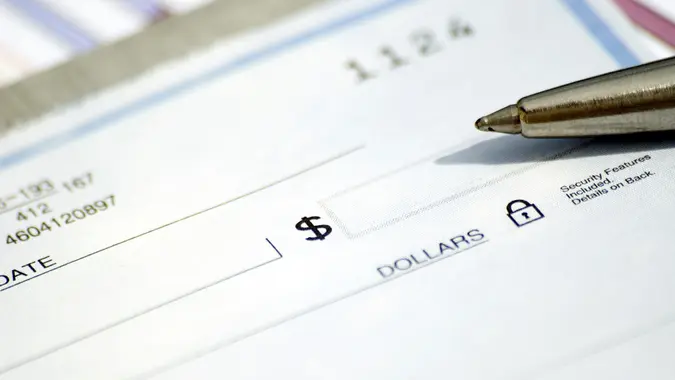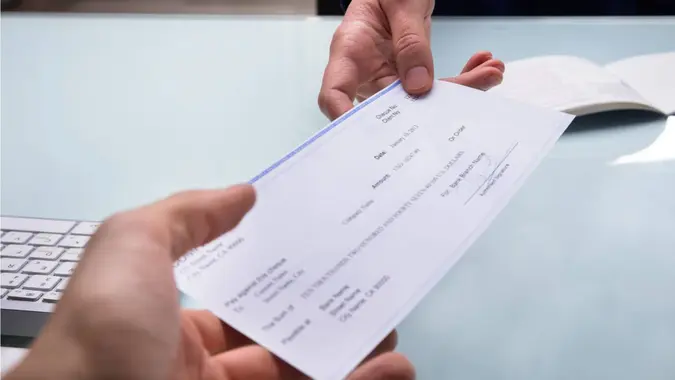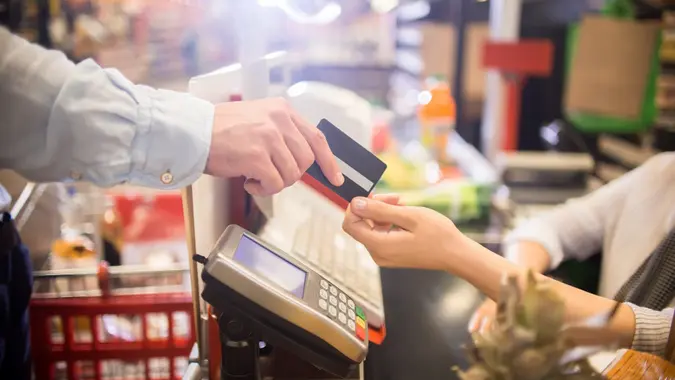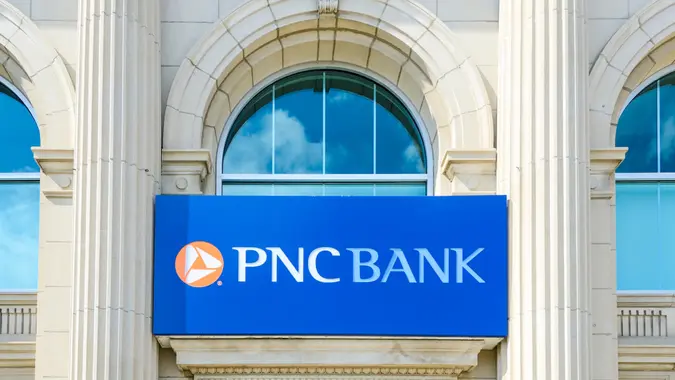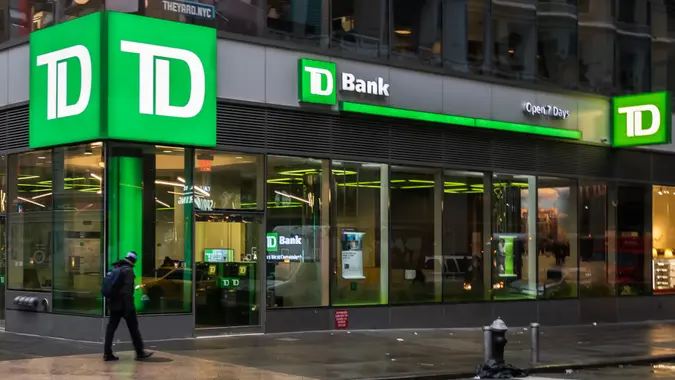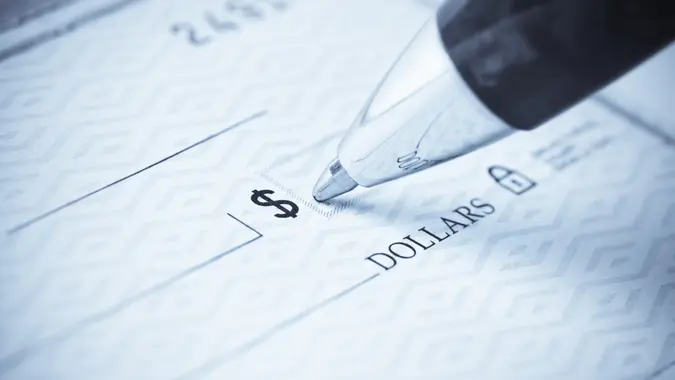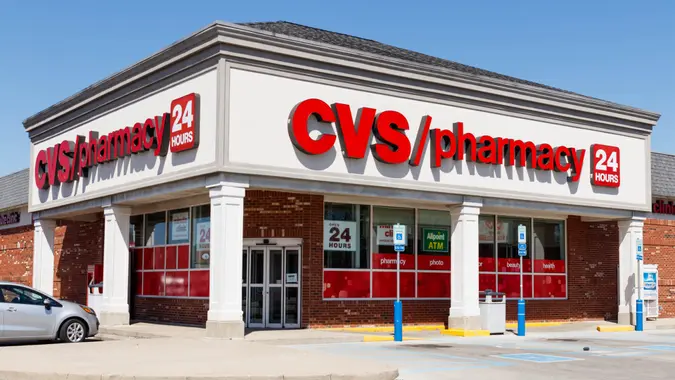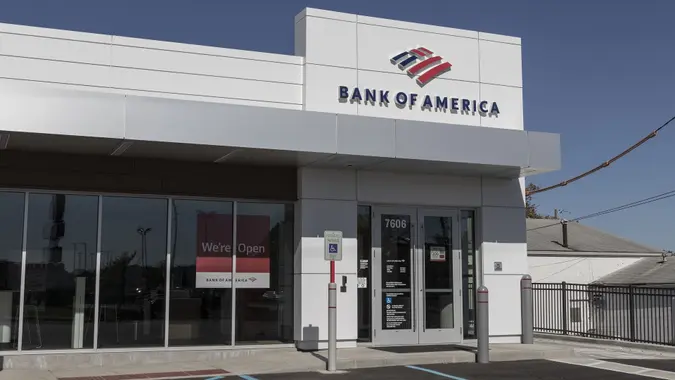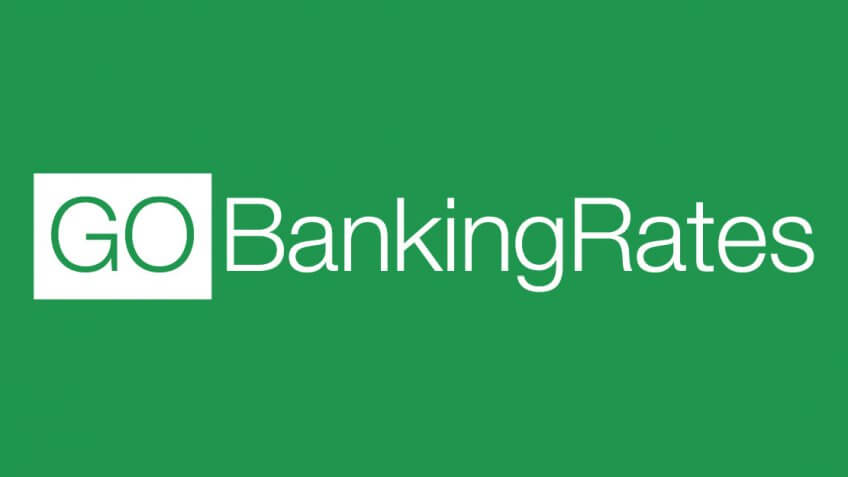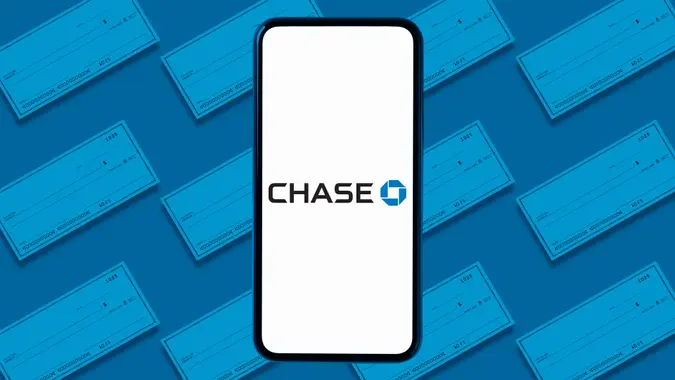Pros and Cons of a Debit Card

Commitment to Our Readers
GOBankingRates' editorial team is committed to bringing you unbiased reviews and information. We use data-driven methodologies to evaluate financial products and services - our reviews and ratings are not influenced by advertisers. You can read more about our editorial guidelines and our products and services review methodology.

20 Years
Helping You Live Richer

Reviewed
by Experts

Trusted by
Millions of Readers
Debit cards go well beyond simply withdrawing cash from ATMs. You can use them for everyday purchases, online shopping, monthly bill payments and even budget management.
Like any financial tool, debit cards have advantages and drawbacks. Here are some pros and cons of a debit card, so you can use it effectively.
What Are Debit Cards and How Do They Work?
A debit card is a payment card that deducts money directly from your bank account. It can be a quicker way to pay than checks or cash. You won’t need to wait to write out an exact amount or count bills and coins.
You can get a debit card automatically with most checking accounts. Some savings accounts also offer them. Keep in mind that some of the best checking accounts also offer cash-back perks for debit cards.
To use a debit card at a point-of-sale (POS) terminal, you can:
- Scan
- Tap
- Insert it into the card slot
Unlike a credit card, you will be asked for your PIN to authorize the sale. Enter the card number, expiration date and CVC code for online purchases. You won’t be asked for your PIN for an online or remote transaction.
The Pros of Debit Cards
Debit cards have many benefits, and here are a few:
Convenience and Accessibility
Debit cards provide direct and immediate access to your money. You can withdraw cash from an ATM or make purchases with the card itself.
Budgeting Benefits
Because a debit card limits you to the money you have in your account, it’s easier to stay within your budget. You’re less likely to make impulse purchases. You can also use the money you save for financial goals, like establishing an emergency fund.
Security Features
Features like PIN authentication, chip technology and fraud monitoring systems add layers of security to your transactions, making it more challenging for scammers to get your debit card information.
No Debt Accumulation
You are limited to the funds in your account. You can’t spend more than you have — excluding overdrafts — and you don’t pay any interest.
The Cons of Debit Cards
There are disadvantages of debit cards that are important to consider. Here are a few:
Limited Fraud Protection
Debit cards typically offer less fraud protection than credit cards, which often have $0 liability. Unauthorized transactions may lead to direct monetary losses from your checking account.
No Credit Building
Debit cards don’t contribute to building your credit history. You are not borrowing money or making repayments.
Overdraft Risks
If not monitored closely, debit card transactions can lead to overdrafts, often resulting in fees if your account balance goes below zero. If you’re looking for ways to avoid overdraft fees, set up your account so it has overdraft protection, or choose one that doesn’t charge these fees.
Fewer Rewards
While credit cards often offer points or miles when you use them to make a purchase, which can then be redeemed for cash, debit cards usually don’t. There are a few debit cards that offer rewards, but they tend to be less generous than those offered by credit cards.
How To Avoid Debit Card Risks
To minimize debit card disadvantages and risks, you can:
- Set up transaction alerts on your bank account to monitor fraud.
- Opt to receive direct deposits so you can quickly restore your account balance.
- Make sure you understand your bank account’s fees and features.
Debit Cards vs. Credit Cards: Key Differences
When weighing the pros and cons of a debit card, it’s helpful to compare it with credit cards. Understanding the differences between debit cards versus credit cards in light of your spending habits can help you figure out which card best suits your lifestyle and financial goals.
| Feature | Debit Cards | Credit Cards |
|---|---|---|
| Spending limits | You spend only what you have in your account. | You can typically accumulate a larger balance since it’s a credit. You may need to pay interest if the amount is too large to pay off when the bill is due. |
| Credit-building | Debit cards do not impact your credit score. | Credit cards impact your credit score. |
| Rewards | This isn’t a common feature, but a few offer perks for debit card purchases. | This feature is much more common among credit cards. |
A debit card is best for:
- Wanting to live within your means
- Making a purchase that doesn’t impact your credit score
A credit card is best for:
- Building credit
- Earning rewards
- Making a large purchase
Who Should Use Debit Cards?
Everybody should have a debit card, if only for the convenience of being able to access your money 24/7. But certain people may want to use a debit card almost exclusively. These include people who want to create a budget and stick to it and those who don’t want to pay interest or annual fees for a credit card.
A debit card is a good way for teenagers and young adults to learn financial responsibility when they first start working. Since they can’t overspend, it will help them learn to budget their money.
Alternatives to Debit Cards
If you don’t want to use a debit card, there are alternatives.
- Cash: You can use cash if you are purchasing something in person.
- Credit card: You can use a credit card but remember that you’ll pay interest if you don’t pay off your entire balance when the bill is due.
- Prepaid card: You can also use a prepaid card, on which you load money to use later. Prepaid cards work similarly to debit cards, but you can only spend what you have deposited on the card.
Deciding between prepaid cards vs. debit cards may ultimately depend on your financial habits. Prepaid cards often have relatively high fees, so choose wisely.
Tips for Using Debit Cards Safely
It’s important to keep safety in mind when using your debit card.
- Protect your PIN. Never write it down and shield the keypad with your hand when you enter it at a point of sale terminal.
- Monitor your account carefully. Immediately report any unrecognized transactions to your bank.
Balancing the Pros and Cons
Debit cards have many benefits, since they’re convenient and give you direct control over your finances. Unfortunately, they don’t have the credit-building capacity and rewards of credit cards.
Think about your current spending habits and lifestyle — what can you do to avoid debt and stop buying nonessentials? Once you know how debit cards work, you can use them as a tool to make managing your money easier and reign in on your spending.
FAQs on Debit Cards
Here are the answers to some of the most frequently asked questions on debit cards.- What should I do if my debit card is lost or stolen?
- Contact your bank immediately if your debit card is lost or stolen, or if you see a debit to your checking account that you don't recognize. The bank will stop your old card and issue you a new one.
- What happens if my debit card is declined?
- You won’t be able to make any purchases if your debit card is declined. Contact your bank to find out why purchases aren’t going through.
- Can I use a debit card internationally?
- Yes, you can use a debit card internationally, but many banks charge a foreign transaction fee. This fee is assessed on ATM withdrawals and point of sale transactions, and is usually 1% to 3% of the transaction.
- How does overdraft protection work with a debit card?
- Overdraft protection typically transfers money from another account to cover the overdraft, or allows your account to go into the negative and charges you a fee.
The article above was refined via automated technology and then fine-tuned and verified for accuracy by a member of our editorial team.
 Written by
Written by  Edited by
Edited by 



